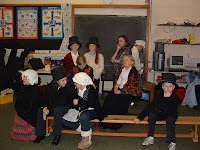
A new term is about to start next week and it always feels like the beginning of a New Year. This time it will also mean bringing together the results of last years collaboration with Shoofly Publishing. We hope to publish the stories 'Bloodlines' which have been written by Anne Curtis with young teenagers in mind. Over three terms Anne and I have taken the stories to middle schools in this region and tested their responses to the themes and the methods of bringing the stories to life. Naturally I chose drama, getting physical with the language and where possible taking the young people outside. Anne introduced them to the language and methods her particular craft of writing envokes and also a chance to handle artifacts.
'Hunter's Moon' is a Gothic Horror story which made an instant impression on the year 8 class
Handling objects can inspire language..'.filigree, rustic, etched, decorative elegant'! it can also release a language of feelings and emotions....'intruding into the past, a sense of tingling suspense'.....
objects can inspire language..'.filigree, rustic, etched, decorative elegant'! it can also release a language of feelings and emotions....'intruding into the past, a sense of tingling suspense'.....
all were words recorded from comments during class.
When combined with visualizing a scene from the Bloodlines story one young writer came up with...'I felt all happiness flood out of my body and replaced by fear for my own life' ...strong and evocative language suitable writing for suspense!
Getting physical with words can mean creating impressions of the shape of objects in an abstract way. This was is an impression of a spiral staircase!
Sometimes the act of creating abstract shapes can focus consentration on the main themes of a story. This a door way suggests the idea of stepping over a barrier into another world with its infered challenge....and a 'sense of tingling surpense...Handling
 objects can inspire language..'.filigree, rustic, etched, decorative elegant'! it can also release a language of feelings and emotions....'intruding into the past, a sense of tingling suspense'.....
objects can inspire language..'.filigree, rustic, etched, decorative elegant'! it can also release a language of feelings and emotions....'intruding into the past, a sense of tingling suspense'.....all were words recorded from comments during class.
When combined with visualizing a scene from the Bloodlines story one young writer came up with...'I felt all happiness flood out of my body and replaced by fear for my own life' ...strong and evocative language suitable writing for suspense!
Getting physical with words can mean creating impressions of the shape of objects in an abstract way. This was is an impression of a spiral staircase!
 The opportunity to dress up in character is a rare and allows the young pupils a way to get into the theme in a personal. Just putting a pile of chosen cloths, blank masks and clothes associated with the period in the centre of the space unleased great excitement and consequent involvement in the story.
The opportunity to dress up in character is a rare and allows the young pupils a way to get into the theme in a personal. Just putting a pile of chosen cloths, blank masks and clothes associated with the period in the centre of the space unleased great excitement and consequent involvement in the story.This was true for the boys as much as the girls.
We have proof of the value of this way of working in the quality of writing which came from some of these creative processes.
On the strength of this experiment the English department in one school has now included 'Gothic Horror' writing project in their curriculum plans for this year.




































